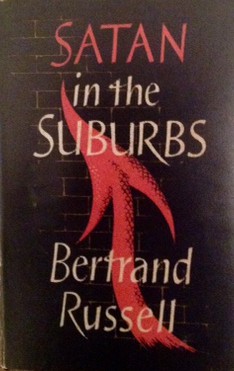Inspiring Older Readers
 posted on 09 Mar 2018
posted on 09 Mar 2018
Satan In The Suburbs by Bertrand Russell
At the grand old age of 80, Bertrand Russell turned his hand to writing fiction and the result was this collection of short stories under the title Satan In The Suburbs. Clearly conscious that people would assume that his fiction would try and address some of the major issues he tackled as a philosopher, mathematician and radical public intellectual, Russell goes out of his way to provide us with an introduction that insists:
I should be very sorry if it were supposed that the stories are meant to point a moral or illustrate a doctrine. Each of them has been written for its own sake, simply as a story, and if it is found interesting or amusing it has served its purpose.
I suppose the obvious riposte to this is that the author doth protest too much. I have no idea what something written for ‘its own sake’ is or whether such a thing can ever really exist. All writing, as George Orwell quite rightly noted, is political and the notion that Russell’s fiction could sit outside that and so wouldn’t in some way be a reflection of his wider thinking is ingenuous.
So I was not at all surprised to find that all of these stories are in fact linked together by a common, philosophical concept - the way in which malign influences thrust themselves into the lives of seemingly ordinary people, and, as a consequence, how fundamentally moral people deal with immoral but compelling forces.
The opening story, Satan In The Suburbs, traces the impact of the mysterious Dr. Mallako on the lives of four people who are foolish enough to take up the Doctor’s offer of having their dull suburban lives transformed when they respond to a plaque that appears on his house promising ‘horrors manufactured here’. Each ‘customer’ finds themselves reaping a whirlwind of their own devising and their subsequent downfall, death or long term punishment is the result of their own deep-seated, darker desires. The story has quite a lot in common with the old horror favourite, the monkey paw that grants you three wishes but which always makes the granting of those wishes contingent on some horrible outcome the owner of the paw hadn't anticipated. Russell's treatment however is rather plodding and lacks any real sense of even the mildest horror.
In The Corsican Ordeal of Miss X a young secretary on holiday inadvertently stumbles on a Corsican secret society dedicated to the overthrow of world governments and the reinstatement of old codes of honour. Trapped in her own web of honour and given the task of executing her employer, can she find a way of being released from her bonds? Sadly I didn't much care.
These two stories represent the meat and potatoes of this collection with The Infra-redioscope being the only other of the three remaining stories in the collection that should detain you. This involves a plot between big business and the media to convince the world authorities that something called an Infra-redioscope had been developed which had detected a Martian invasion fleet for which the world must prepare. But what starts as a scam to boost arms sales and budgets might actually turn out to have an odd twist……
Taken overall, Russell’s writing skills aren’t those of even a modest fiction writer. The plots are convoluted and predictable and lack any real sense of jeopardy or terror – not necessarily because the plots are lame but because he doesn’t really have a sense of how to construct fiction. He’s poor at dialogue and his character development is virtually non-existent.
I’m pretty sure these stories would never have found their way into print if they hadn’t come with the name of Bertrand Russell attached to them. They detained me for an afternoon but it’s an afternoon of reading time I’ll never get back – and that makes me a bit grumpy.
Terry Potter
March 2018